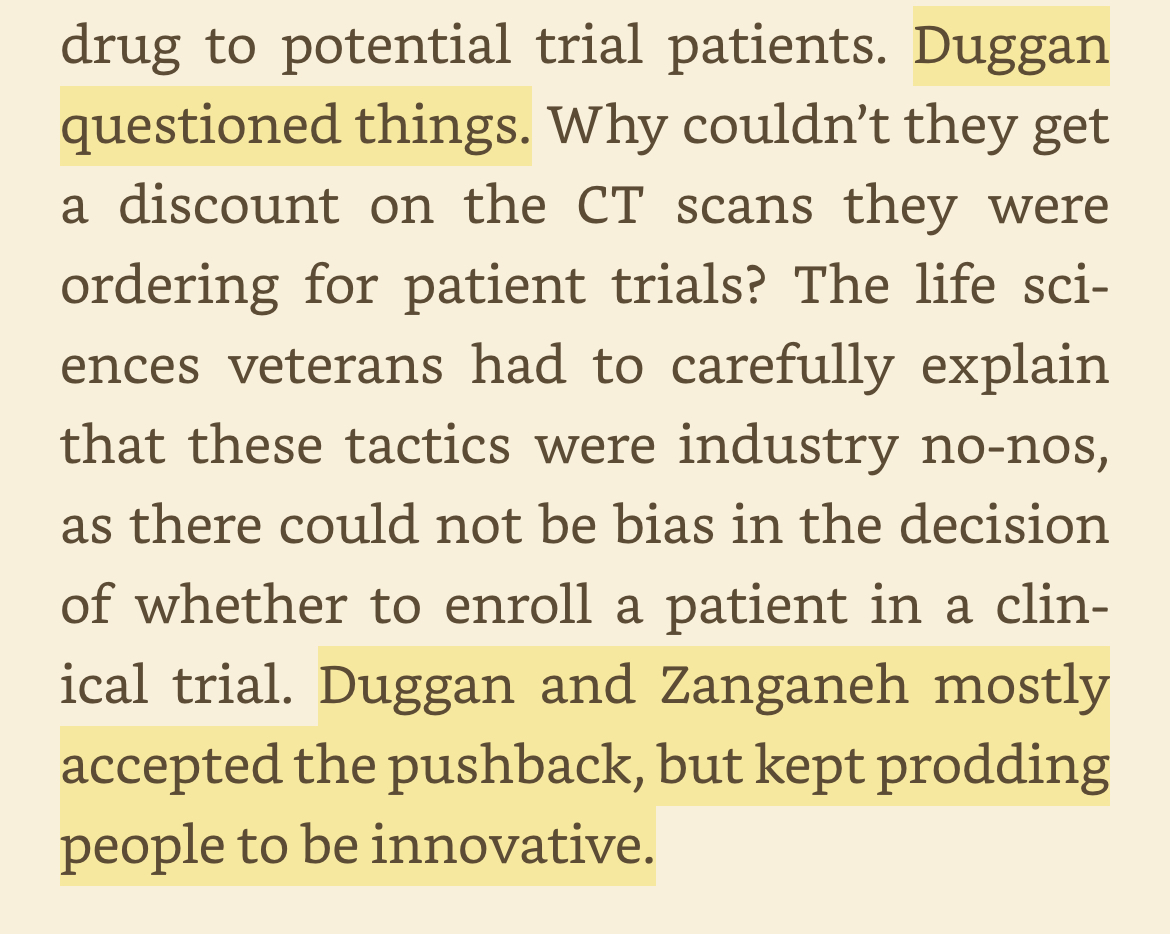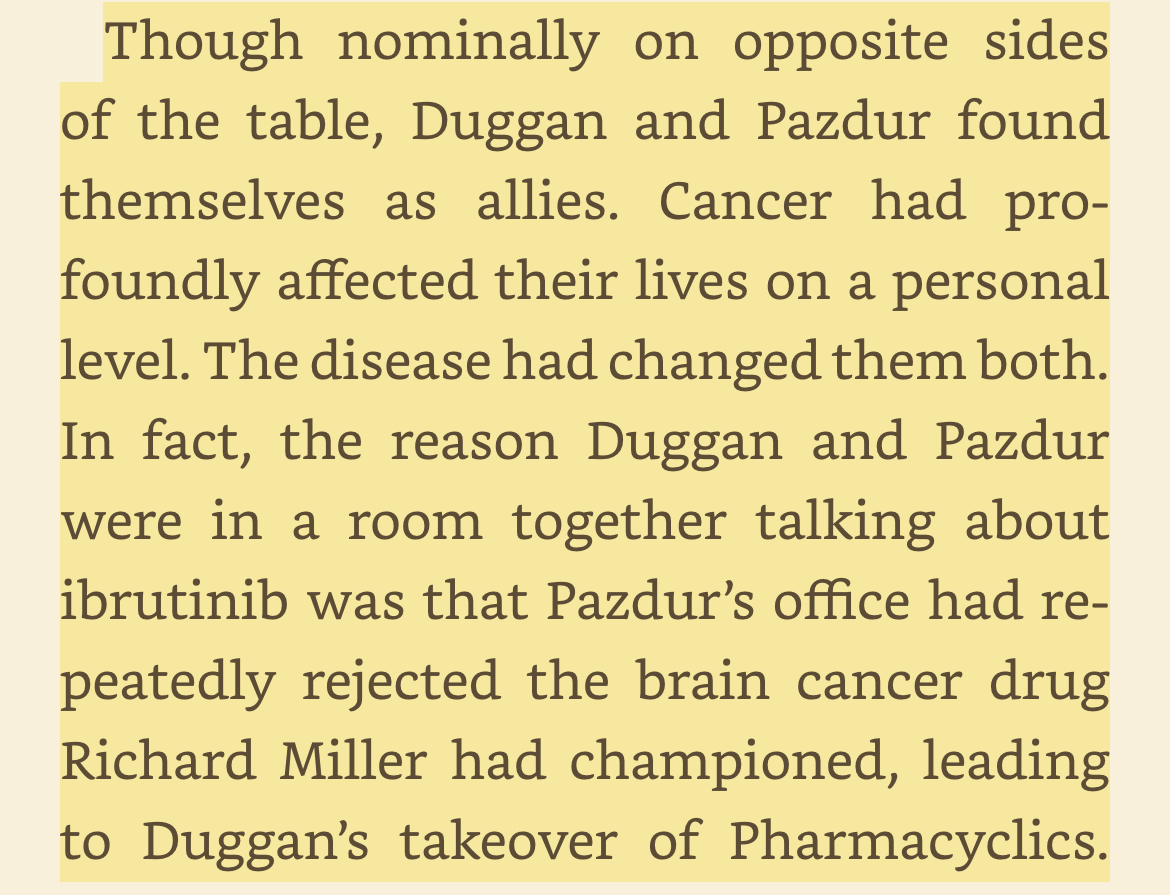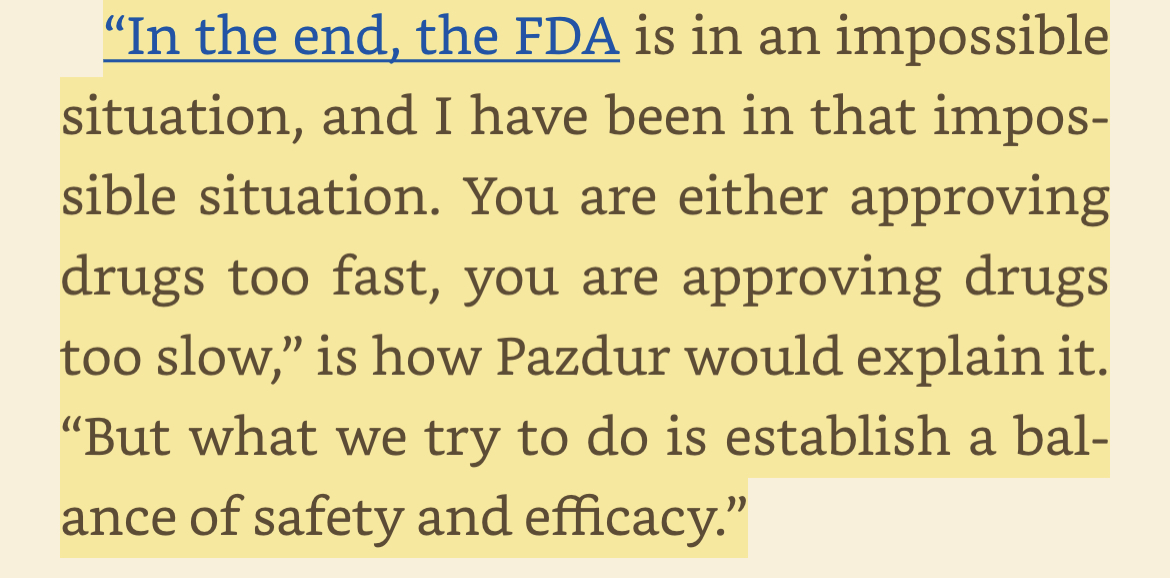Everyone in biotech should read this book.
8 insights for those who want to succeed and have an impact in this beautifully unique business:
8 insights for those who want to succeed and have an impact in this beautifully unique business:

1. Ambition + Purpose > Skill.
Bob Duggan, the man who took over Pharmacyclics from its founder and Stanford professor Richard Miller, was neither a scientist nor a doctor.
He was a college dropout!
Bob Duggan, the man who took over Pharmacyclics from its founder and Stanford professor Richard Miller, was neither a scientist nor a doctor.
He was a college dropout!

Yet, he had a strong why.
After the tragic death of his son at age 26 from cancer, Duggan had an unwavering determination to save lives:
After the tragic death of his son at age 26 from cancer, Duggan had an unwavering determination to save lives:

Maky Zanganeh, the Head of Business Development who later became Pharmacyclics' COO and the second most powerful person in the company, had no pharma or oncology experience either.
She was a ... dentist!
She was a ... dentist!

2. An outsider challenges beliefs and pushes for innovation.
If you're not an outsider, surround yourself with people who're going to challenge your assumptions.
If you're not an outsider, surround yourself with people who're going to challenge your assumptions.

3. God, save the billionaires.
Duggan loaned Pharmacyclics $6.4 million in 2009 when investors were running for the hills.
Without his loan, the company would have gone bankrupt and never developed the drug that's saving hundreds of thousands of blood cancer patients today.
Duggan loaned Pharmacyclics $6.4 million in 2009 when investors were running for the hills.
Without his loan, the company would have gone bankrupt and never developed the drug that's saving hundreds of thousands of blood cancer patients today.

Wayne Rothbaum, the man who started the rivalry company that developed the other blockbuster drug, was a billionaire New York stock trader.
He invested one-third of his net worth into the company and convinced his billionaire friends to shoulder the rest of the investment.
He invested one-third of his net worth into the company and convinced his billionaire friends to shoulder the rest of the investment.

You can't start a biotech company in your garage.
It costs more than $1 billion to bring a drug to market.
I agree with the author that we need venture capitalists, hedge fund managers and Wall Street to be involved in drug research.
It costs more than $1 billion to bring a drug to market.
I agree with the author that we need venture capitalists, hedge fund managers and Wall Street to be involved in drug research.
These guys are not just "backers".
They have insight, they're extremely knowledgeable, they've seen patterns and they're active players in the fight against cancer.
They have insight, they're extremely knowledgeable, they've seen patterns and they're active players in the fight against cancer.

4. The regulators are people.
You're not dealing with the FDA; you're dealing with people.
Believing that regulators exist to make your life harder won't get you far.
Richard Miller, the founder and ex-CEO of Pharmacyclics had declared war against the FDA. It didn't help:
You're not dealing with the FDA; you're dealing with people.
Believing that regulators exist to make your life harder won't get you far.
Richard Miller, the founder and ex-CEO of Pharmacyclics had declared war against the FDA. It didn't help:

Rich Pazdur was known in the FDA as Doctor No.
It was very hard to get drugs approved by him.
But after his wife lost the battle against cancer, Pazdur changed and set out on what he described as "a jihad to streamline the review process and get things out the door faster".
It was very hard to get drugs approved by him.
But after his wife lost the battle against cancer, Pazdur changed and set out on what he described as "a jihad to streamline the review process and get things out the door faster".

Regulators are walking on a very thin line.
Being a little too loose or being a little too tight both risk the lives of thousands of patients:
Being a little too loose or being a little too tight both risk the lives of thousands of patients:

5. Capital will always be available to those who want to redefine human health.
The current economic environment may look gloomy for biotech and all industries, but I've always held a firm belief that capital will always be available to the crazy ones, the misfits, the rebels...
The current economic environment may look gloomy for biotech and all industries, but I've always held a firm belief that capital will always be available to the crazy ones, the misfits, the rebels...

6. Biotech is a people's game.
Vardi said in an interview: "In my book, I wanted to answer one question: how amazing drugs are created today."
To me, Vardi's book is about people: human emotions, egos, motivation, ambition and the transcendence of human existence.
Vardi said in an interview: "In my book, I wanted to answer one question: how amazing drugs are created today."
To me, Vardi's book is about people: human emotions, egos, motivation, ambition and the transcendence of human existence.
To bring a breakthrough to the patient, extraordinary effort is required from scientists, biopharma, investors, and regulators.
All these players have their own legitimate and honourable agenda.
All these players have their own legitimate and honourable agenda.
There's no way you can succeed in this business unless you've understood each player's motivations.
And you may do all this and still fail because...
And you may do all this and still fail because...
8. Every motivation is beautiful.
Although the book is called For Blood and Money, I don't think that biotech is the easiest path to riches.
Every character in this book, including the hedge fund managers, is motivated by something beyond money.
Although the book is called For Blood and Money, I don't think that biotech is the easiest path to riches.
Every character in this book, including the hedge fund managers, is motivated by something beyond money.
In my case, seeing founders who were willing to go against the odds to get their technology to the patient was seductive!
I thought, if I can support these guys and increase their odds of success, I'm having my own impact on human health.
But that's just my motivation.
I thought, if I can support these guys and increase their odds of success, I'm having my own impact on human health.
But that's just my motivation.
To me, every motivation is beautiful and necessary in this business as long as one is not being unethical.
For blood... or money.
Loving you, Angelos.
ps: Thank you @nathanvardi for writing this book for all of us.
pps: if you liked it, pls retweet to help this fly higher.
For blood... or money.
Loving you, Angelos.
ps: Thank you @nathanvardi for writing this book for all of us.
pps: if you liked it, pls retweet to help this fly higher.
• • •
Missing some Tweet in this thread? You can try to
force a refresh












